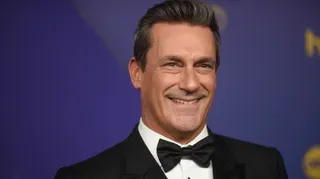September 9, 2022
2022 Toronto Int. Film Fest Diary: Entry 1 - Are the Movies Really Back?
C.J. Prince READ TIME: 4 MIN.
The 47th edition of the Toronto International Film Festival kicked off this week, and like the Cannes Film Festival, the message is clear: The movies are back (or so they say). After two years of hybrid editions due to the ongoing pandemic, TIFF switched back to a largely in-person affair this year, although viewers in Canada can sample a small portion of the lineup virtually. Of course, the celebrations around the theatrical experience are done more out of a need for survival than anything. COVID prompted an existential crisis for the industry, and as everyone gets dragged into a new world, cinema is making damn sure it won't get left behind.
The only problem is that the movies aren't really back, and all it takes is watching them to see why. The nature of film production poses a risk for spreading COVID, meaning new, restrictive health and safety protocols that eat at budgets and force filmmakers to scale down. This also means less movies getting made (August was a deadzone for studio releases this year, whereas normally it would have several blockbusters), and less to work with for the lucky ones that do get to shoot. "Top Gun: Maverick," by far the biggest film of the year and responsible for reviving the box office, was also made pre-pandemic, which could be a mere coincidence or a sign of something depending on how you look at it.
All of this is to say that, as much as TIFF may talk about cinema's comeback, we're not out of the woods just yet. That makes it hard to get excited about this year's edition, although after attending this festival for more than a decade, I'm lucky to have a muscle memory that can force me into theaters. And as much as filmmaking has changed and adapted over such a short time, there will always be room for surprises and discoveries. Take Albert Serra's "Pacifiction" as an example, which I saw at Cannes in a state of exhaustion that made enough of an impression on me to make me revisit it months later.
As someone who has outright hated every Serra film I've seen, I found myself shocked at how much I enjoyed "Pacifiction," by far his best and most accessible film. Set on the French Polynesian islands, it follows French High Commissioner De Roller (Benoît Magimel), a politician who spends most of his time mingling between locals, high-class visitors, and people involved with behind-the-scenes politics. Rumors of the French resuming nuclear testing on the islands begins to spread, which De Roller dismisses until he begins to suspect his bosses have been keeping him out of the loop.
That hook of paranoia and conspiracy is enough to carry "Pacifiction" along its lengthy runtime, even if Serra prefers to keep plot on the sidelines. Magimel gives one of the best performances of the year as De Roller, who lumbers around from one area to another in an ill-fitted white suit, whose position and attitude embody the relic of French colonialism that he is. Serra establishes the thread of paranoia early on, and rather than resolve it he leans into it, abstracting the narrative and eventually the film itself, as De Roller gets no answers and loses his sense of what's real. Serra's rendering of De Roller's descent into irrelevance as a liminal space, where everything succumbs to the gorgeous, oversaturated visuals and sleek synth score, is a sight to behold.
On the discovery side, it's early in the festival but I have a hard time imagining any other new film at the festival will beat out Graham Foy's "The Maiden" as one of the strongest titles playing here. Split into two halves, it follows best friends Kyle (Jackson Sluiter) and Colton (Marcel T Jimenez) along with high school freshman Whitney (Hayley Ness). The first half hones in on Kyle and Colton's aimless hangouts in their suburban neighborhood, where they pass the time smashing old TVs or spray painting areas along railroad tracks. A tragic accident takes Colton out of the picture, leaving Kyle adrift as he tries to process his grief and navigate life on his own.
The second half goes back to the film's beginning, this time from Whitney's perspective, who finds herself devastated when her best friend breaks up with her as their paths diverge in high school. Foy's specificity in his portrayal of teenage loss, where all the free time afforded by youth hangs like a weight on Kyle and Whitney, creates a compelling atmosphere combined with cinematographer Kelly Jeffrey's dense, grainy imagery and an immersive soundtrack. But as soon as "The Maiden" settles into its back half, it switches things up again, as Whitney journeys into the town's surrounding forest and discovers something impossible. It's best to discover what surprises Foy has in store rather than state it here, but at its best the film evokes the films of Apichatpong Weerasethakul, where a modesty in storytelling gives way to high ambition, and a world where anything is possible.







